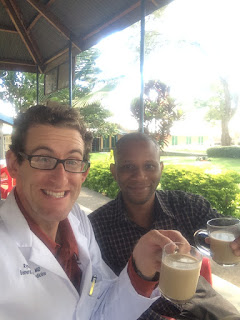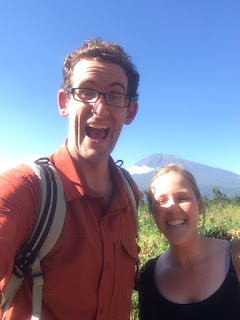Jambo, from Arusha! Hope this finds you well! Since my last
update, I have shifted into spending more time on the internal medicine ward at
Selian Lutheran Hospital, the government district hospital at the outskirts of
town. The walk to Selian, as I have mentioned previously, is quite beautiful
and offers plenty of time to interact with the school children who come and go
at similar times as us. I would suffice the walking experience to say that the
only thing you can truly expect is the distance. The walk is long, literally up
hill the entire way (but not both ways), but it is often quite refreshing and
one of the closest interactions we have with the community around us. Work at
Selian has engaging, with many interesting cases and a great group of coworkers.
The Xray machine, which has been a prolonged saga of working, not working,
working again, not working, is currently working! It is something that I have
taken for granted in my practice to have a simple device such as an Xray; it is
a luxury that I had come to rely on, but being without it has definitely
stretched our skills in physical examination and creativity. That being said,
it is a relief to have it back.
This week for our Swahili lesson I would like to introduce kwaheri. The meaning is simple,; it is
equivalent to good-bye. Literally, it
means go with luck or happiness, which adds some richness to the expression, in
my opinion. I wanted to introduce this word today, not because I am leaving
(still have about 4 months left here), but because a good friend is departing.
If you remember from some of my wintertime updates, Joseph is one of the
pediatric registrars who has been at Selian for about 3 years. Beginning my
time in Tanzania on the pediatric ward at Selian, Joseph was a peer with whom I
was completely impressed. There is something entirely different about Joseph: a
joy in the work that he does, a commitment to improving the care of patients,
and a curiosity in the science and art of medicine that makes him one of
Selian’s best young doctors. His knowledge of pediatrics is impressive,
especially for not having formal training in the field, and he is always
looking to add to it. On top of his skills in pediatrics, he also has a rich
personality, both humorous and introspective. I had the great opportunity to
host Joseph while he spent one month in Minneapolis taking the Tropical
Medicine Course offered at the University. It was then that we really became
friends. This year Joseph was accepted into a pediatrics residency program in
China, which is a tremendous opportunity. He plans to return to Selian to
continue his work in pediatrics after his 3 years of training. Selfishly, I am
entirely sad to see him leave. It is an odd feeling to be in Arusha long enough
to see many people coming and leaving; but of all the people I have met, I will
certainly miss Joseph the most. But I recognize the significance of his
departure, that he is becoming the future of Tanzania; this opportunity is part
of the fulfillment of his goals and a new piece of hope for Selian. Thus, it is
with a heavy and hopeful heart that I say, kwaheri,
go with luck, my friend.







